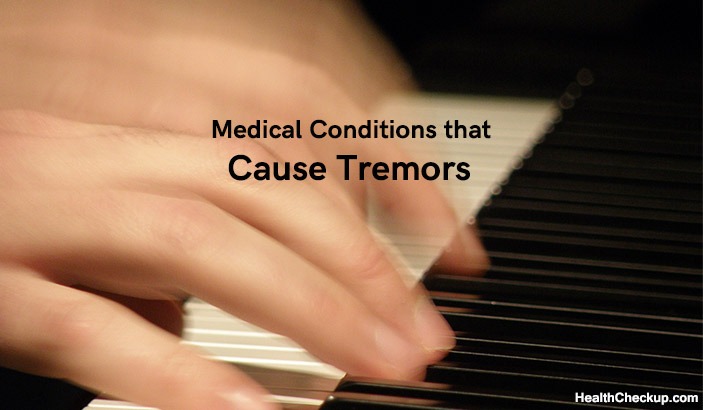You shiver when it is cold, but the moment you sip some hot chocolate or wrap yourself in woolies, you heave a sigh of relief as your shivering ceases. However, just imagine a person who suffers from tremors due to a medical condition. This kind of shivering will never stop unless the underlying condition is treated. Yes, there are numerous medical conditions that cause tremors, which are completely different from muscular spasms and twitches.
Tremors occur due to some problem on the part of the brain that is responsible for controlling muscular movements. While tremors may not be life-threatening, you should not take them lightly. Tremors are a sign of a serious medical condition and you should get yourself thoroughly evaluated by a doctor to find the cause. Once the doctor figures out the cause, they will chart out a course of treatment.
Different Types of Tremors
You can experience tremors in any part of your body. However, tremors are categorized as resting and action tremors.
Resting tremors, as the name indicates, occur when you are lying or sitting, without any movement. Once you move, the tremors tend to disappear. Resting tremors are usually confined to your hands and fingers.
Then there are medical conditions that cause tremors when you move. These tremors are known as action tremors and further subdivided as follows:
-
Postural Tremor when you try holding your body against gravity, like elevating and stretching out your hand
-
Intention Tremor that occurs when you make a definitive movement, such as touching your nose with your finger
- Task-Oriented Tremor occurs only when you performing a certain activity, like writing
- Kinetic Tremor occurs only when you move a certain body part
- Isometric Tremor occurs when you voluntarily contract a muscle without actually moving that muscle
What are the Causes of Tremors?
While researchers know that there are certain medical conditions that cause tremors, there are other triggers as well. Some of the causes of tremors include the following:
- Certain prescription medications
- Stress
- Injuries
- Consuming too much caffeine
- Muscular fatigue
- Low blood sugar levels
- Aging
Medical Conditions That Cause Tremors
Parkinson’s Disease:
This is a progressive neurological disorder affecting the brain. While researchers do not know why certain people get Parkinson’s disease, they know the brain cells that produce dopamine, a neurotransmitter that controls muscle movement, begin to die. As levels of dopamine plunge in the body, symptoms of Parkinson’s disease begin to manifest.
Multiple Sclerosis:
MS or Multiple Sclerosis is a chronic disease pertaining to the central nervous system. It is categorized as an autoimmune disorder where the immune system of the body attacks the myelin sheath, a protective layer surrounding nerves. As a result, it causes lesions and the brain cannot send signals via these damaged nerve fibers to the rest of the body.
Sepsis:
This is another medical condition that is not only life-threatening, but can also result in tremors. Sepsis occurs when an infection spreads across the body and your immune system releases chemicals to fight this infection. Sepsis is a medical emergency and should be treated right away.
Grave’s Disease:
Also known as hyperthyroidism, Grave’s Disease is an autoimmune disorder where your immune system attacks the thyroid gland, causing it to produce more thyroid hormones than the body requires.
Huntington’s Disease:
This is a disease that is passed down the family. It causes the nerve cells in the brain to die and this affects movements, resulting in tremors. There is no cure for Huntington’s disease, but there are ways to help you handle the symptoms.
Severe Acute Respiratory Syndrome:
SARS is a serious type of viral pneumonia that is caused by the SARS coronavirus. Besides tremors, you will also have a high grade fever, rash, shivering, sore throat, dry cough, malaise, headaches, and body ache.
Treatment for Tremors
There are so many medical conditions that cause tremors. Hence, there is a wide range of treatment options. This said, tremors are difficult to treat, but if the underlying medical condition is treated, your tremors may disappear.
Some of the treatments for tremors are as follows:
Medication:
Your doctor may prescribe you anti-seizure medications, tranquilizers or Beta blockers to treat tremors. Usually, Beta blockers are used for controlling high blood pressure but can be effective in reducing tremors. They are often the first line of treatment.
Botox:
Your doctor may recommend Botox injections if you suffer from tremors on your face. The Botox will numb the muscles and hence, you will not feel the muscles quivering and shivering. This is a temporary method to treat tremors as Botox get reabsorbed by the body over a few months.
Physical Therapy:
If you are experiencing tremors due to an injury or some other medical conditions that cause tremor, physical therapy can help you not only strengthen the weak muscles but also improve your balance and coordination.
Brain Stimulation Surgery:
If medical conditions that cause tremors are hindering your normal functioning, doctors may resort brain stimulation surgery. The surgery involves positioning an electrical probe in that part of the brain that is causing the tremors. The wires from the probe are placed in your chest region, under the skin and a device too is attached to your chest and connects with the wires. Each time you experience tremors, the device will send an electrical signal to the brain to stop the tremors.
There are many non-medical and medical conditions that cause tremors. It is important you visit a qualified neurosurgeon or neurologist to find out the cause of tremors. This will allow you to get the right treatment for tremors. If you have a chronic and progressive disease, your tremors may not disappear, but the right treatment can reduce the tremors to help you function normally. Finding the best specialist will help you get timely treatment to resolve your medical condition that is causing the tremors. So, go ahead and make an informed decision.
Medically Reviewed By

Maanasi specializes in health topics including diet and nutrition. A mother of an untiring seven year old, she enjoys nurturing her love affair with English. She is often found nestled with a book, plopped against a dozen pillows, smiling away at the brink of finishing yet another book of the many dozens, that adorn the shelves of her Mini Library!








